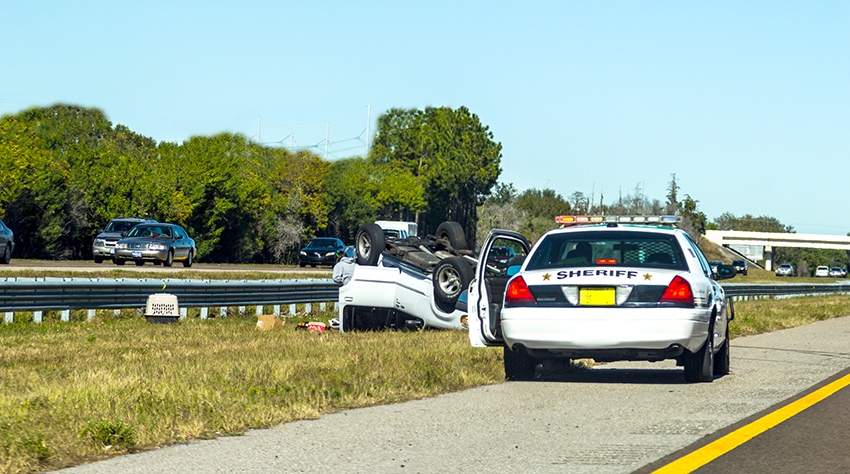Even though most car accidents occur within a 25-mile radius of drivers’ homes, have you ever considered that being involved in an automobile accident in a U.S. state other than where you reside might change your situation as it relates to personal injury lawsuits?
This topic may especially be of interest to individuals who drive across state lines for work, vacation, and leisure, or to visit family on a regular basis.
Contact the attorneys at Bart Durham Injury Law if you have been involved in a car accident in Tennessee, or if you are a Tennessee resident who has been in an accident out-of-state!
Car Accident Injury Lawsuits Differ State-to-State
In fact, if you are involved in an accident in another state – whether you are the innocent or guilty party – you will be subject to the laws of that state.
For instance, it is good to know that each U.S. state has its own laws concerning minimums for liability and statute of limitations laws. Some states use a No-Fault Insurance System. Finally, the situation only gets more complicated if neither of you are from the state where the crash occurred.
All of these factors can ultimately affect your personal injury case, should you choose to pursue compensation for damages. Here are a few explanations.
Minimums for Liability
Every state has minimum car insurance requirements, which is the minimum amount of coverage you need to be considered legally insured and to drive your car. In most cases, your liability coverage will rise to meet the requirements of the state where the accident occurred, but it is wise to see if your auto insurance policy has limits.
For example, the minimum for bodily injury liability insurance (BI) in Tennessee is $25,000 per person and $50,000 per accident, but neighboring state North Carolina requires a minimum BI of $30,000 per person and $60,000 per accident.
Statute of Limitations Laws (SOL)
Every state gives a certain window of time for victims to file a claim against another driver for personal injury or damage, also known as statute of limitations laws (SOL).
Tennessee, for example, has a one-year deadline for most car accident injury lawsuits, but neighboring states like Alabama and Arkansas have two- and three-year deadlines, respectively.
No-Fault Auto Insurance
In 12 states (including Florida, Hawaii, Kansas, Kentucky, Massachusetts, Michigan, Minnesota, New Jersey, New York, North Dakota, Pennsylvania, and Utah), drivers cannot rely on others’ car insurance coverage to pay for their injuries following a car accident – even if the other driver was at-fault.
These states instead require drivers to have personal injury protection (PIP) coverage in addition to bodily injury and property damage liability coverage. This is known as no-fault insurance.
Unfortunately, in no-fault states, even innocent drivers who become victims in automobile accidents have limited rights to sue for any medical injuries they suffered; that is, unless the injuries are severe. At-fault states even determine “severe injuries” differently, such as if your medical bills reach a certain amount.
The state of Tennessee is not a no-fault state. If you are injured in a car accident in Tennessee, you may be able to recover damages from the other driver’s insurance company through a personal injury lawsuit.
What to Do Following An Out-of-State Car Accident
There are several things you simply must do following an accident, whether they are in your state of residence or not. But there are also specific things you want to do if you are out-of-state.
Find Safety & Collect Evidence
Just like any other car accident, do the following immediately after your out-of-state crash:
- Make sure you and your passengers are safe.
- Do not get out of your vehicle if you are dizzy or in pain; wait for emergency responders to arrive.
- Pull out-of-the-way of traffic, turn-off your engine, and turn-on your car’s emergency lights.
- Call the police to report the incident.
- Cooperate when they and other emergency responders arrive, and make sure to get a copy of the police report.
- Record the name, contact information, license plate, insurance company, and insurance policy of the other driver(s) involved in the accident.
- Take pictures of the scene and collect the names / contact information of any witnesses.
Do Not Admit Fault
If you are, in fact, responsible for the car accident or even if you believe you might be at fault, do NOT admit any fault right away. Even apologizing can even be considered admitting fault.
Admitting fault does two things: It prematurely places blame on yourself that can be difficult for you and your insurance company to disprove, and it puts you at risk of not receiving any compensation you might have been entitled to.
Instead of saying the accident was your fault, or even apologizing, simply state the facts. When it comes to your insurance company or anyone else who presses you for more details, enlist the help of your lawyer to help you share what needs or need-not be shared.
Talk to A Car Accident Attorney ASAP
After a collision or automobile accident, it is crucial to talk to a car accident attorney in the state where the accident occurred as quickly as possible. Ultimately, this will be to your advantage because you will not only want a lawyer who can navigate the laws of their state on the appropriate timeline, but also who can seek appropriate compensation from the other driver for damages to your vehicle, personal injuries and medical bills, etc.
It is also a good idea to contact a lawyer YOU trust from your home state and see if they can provide a referral to a personal injury firm THEY know and trust.


